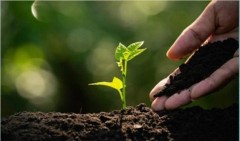03.12.2021
World Soil Day

World Soil Day is celebrated annually on December 5 to remind the world community of the importance of soil resources and the role they play in preserving ecosystems and ensuring the growth of human well-being.
The history of this day originates in 2002, when the corresponding resolution was adopted by the International Union of Soil Sciences. Scientists then drew attention to the need to understand the importance of the planet's soil resources at the international level.
Their task was to reassess the understanding, both by ordinary citizens and by the authorities of all countries of the world, of the role that soil resources play in the life of a person and state, as well as in the ecosystem of the planet. Only the awareness of the importance of preserving the planet's soil resources can radically change the policy of the ruling structures of any state in this area.
The resolution of the International Union of Soil Sciences was supported by FAO (Food and Agriculture Organization of the United Nations). Together with Thailand, this organization took the UN initiative to establish a day dedicated to the problem of soil resources of the Earth. In December 2013, the UN General Assembly proclaimed December 5 as World Soil Day.
A more detailed acquaintance with the reports of the FAO representatives made many people realize the real role of soil in the life of mankind. Soils are one of the fundamental structures of the ecosystem, providing living space for humans and the world of flora and fauna, maintaining biological diversity, the main component of the production of feed and food, one of the conditions for safety and sustainability in the face of unfavorable climatic factors, etc.
The soil cannot be viewed simply as a stable foundation under a person's feet. Desert - also provides sustainability, but deprives a person of the opportunity to grow food. That is, the factor of land fertility plays one of the key roles in our life. From this point of view, ecologists and FAO representatives are concerned that about a third of the world's soil resources are degrading, and some are subject to desertification.

Salinization and soil codification are major ecosystem-threatening soil degradation processes and are recognized as some of the most important global issues for agricultural production, food security and resilience in arid and semi-arid regions. The topic of December 5, 2021 is “Stop soil salinization, raise soil productivity”.
Saline soils - soils with an excessive content of readily soluble mineral salts. Salts penetrate into the soil from underground deposits, together with precipitation and from underground waters. Especially prone to soil salinization in coastal areas near the seas and oceans. Mineral substances get into the soil and watering plants. Almost all water in the world contains impurities, so salinization of any soil is inevitable.
Protection of soil fertility is an important issue for Belarus. More than 40% of the country's territory is occupied by agricultural land, a significant part of which is drained peatlands. The issue of soil pollution is also relevant, especially in the context of the consequences of the accident at the Chernobyl nuclear power plant. In accordance with regulatory legal acts, observations of the chemical pollution of soils in the Republic of Belarus are carried out by the state institution "Republican Center for Hydrometeorology, Radioactive Contamination Control and Environmental Monitoring" subordinate to the Ministry of Natural Resources and Environmental Protection of the Republic of Belarus on the networks of observation points formed for points, background areas and roadside strips of highways. Systematic observations are carried out at more than 1100 observation points on the territory of 34 cities of the republic - regional centers, cities with a population of 50 or more thousand people, as well as settlements with a population of less than 50 thousand, in which large industrial enterprises are concentrated (Krichev, Beloozersk, Novolukoml, Volkovysk, Kalinkovichi, Luninets, Kostyukovichi, Rogachev, Berezovka, Krasnoselsky). The monitoring network for soil chemical pollution in the background areas includes 90 observation points (15 points in each administrative region) in areas characterized by a minimum anthropogenic load with natural soil cover and vegetation. Observations of the chemical contamination of the soils of the roadside strips of the republic's highways are carried out on 22 soil profiles (observation points) in the zones of influence of highways of republican significance with different traffic intensities.
Some figures for soils from the Food and Agriculture Organization of the United Nations (FAO)
Soils directly or indirectly provide 95% of human food. About 1/3 of our food becomes waste, and almost half of household waste can be recycled into compost that feeds the soil.
By 2050, the world's population will exceed 9 billion people, and agricultural production worldwide will increase by about 60%.
Soils are the habitat of about 1/4 of all biological species on our planet. There are more living organisms in one teaspoon of healthy soil than there are people on planet Earth.
33% of soils worldwide are moderately to severely degraded due to erosion, salinization, compaction, acidification, chemical pollution and nutrient depletion.
Every year the Earth loses 24 billion tons of fertile soil.
Every hour in Europe, expanding cities take over 11 hectares of soil. Land-use changes and drainage of organic soils for cultivation are responsible for about 10% of all greenhouse gas emissions.
Rational use of soil resources (increasing the content of soil organic matter, maintaining vegetation on the soil surface, wisely using nutrients, promoting the organization of crop rotations, combating erosion) can increase yields by an average of 58%.
More information about the critical role of soils for the existence of the biosphere on our planet can be found on the website of the International Year of Soils.
Protection of soil fertility is an important issue for Belarus. More than 40% of the country's territory is occupied by agricultural land, a significant part of which is drained peatlands. The issue of soil pollution is also relevant, especially in the context of the consequences of the accident at the Chernobyl nuclear power plant. Scientists of Belarus are actively working in such promising areas as sustainable farming, organic farming, precision farming.
Some figures for soils from the Food and Agriculture Organization of the United Nations (FAO)
Soils directly or indirectly provide 95% of human food. About 1/3 of our food becomes waste, and almost half of household waste can be recycled into compost that feeds the soil.
By 2050, the world's population will exceed 9 billion people, and agricultural production worldwide will increase by about 60%.
Soils are the habitat of about 1/4 of all biological species on our planet. There are more living organisms in one teaspoon of healthy soil than there are people on planet Earth.
33% of soils worldwide are moderately to severely degraded due to erosion, salinization, compaction, acidification, chemical pollution and nutrient depletion.
Every year the Earth loses 24 billion tons of fertile soil.
Every hour in Europe, expanding cities take over 11 hectares of soil. Land-use changes and drainage of organic soils for cultivation are responsible for about 10% of all greenhouse gas emissions.
Rational use of soil resources (increasing the content of soil organic matter, maintaining vegetation on the soil surface, wisely using nutrients, promoting the organization of crop rotations, combating erosion) can increase yields by an average of 58%.
More information about the critical role of soils for the existence of the biosphere on our planet can be found on the website of the International Year of Soils.
Protection of soil fertility is an important issue for Belarus. More than 40% of the country's territory is occupied by agricultural land, a significant part of which is drained peatlands. The issue of soil pollution is also relevant, especially in the context of the consequences of the accident at the Chernobyl nuclear power plant. Scientists of Belarus are actively working in such promising areas as sustainable farming, organic farming, precision farming.















